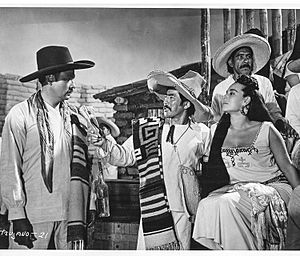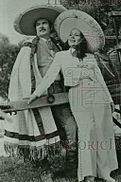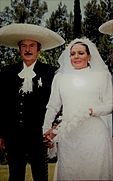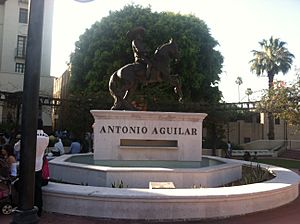Antonio Aguilar facts for kids
Quick facts for kids
Antonio Aguilar
|
|
|---|---|
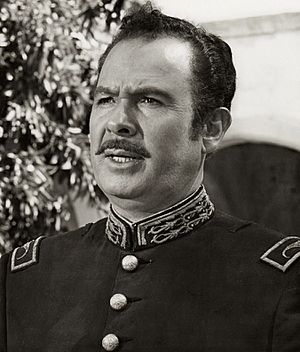
Aguilar in The Undefeated (1969)
|
|
| Born | 17 May 1919 Villanueva, Zacatecas, Mexico
|
| Died | 19 June 2007 (aged 88) Mexico City, Mexico
|
| Resting place | Cerro de San Cayetano, El Soyate, Zacatecas, Mexico |
| Other names | El Charro de México Tony Aguilar Pascual Barraza The Godfather of Banda Music |
| Occupation | Singer, actor, songwriter, equestrian, film producer, screenwriter |
| Years active | 1950–2005 |
| Spouse(s) |
|
| Children |
|
| Relatives | Leonardo Aguilar (grandson) Ángela Aguilar (granddaughter) Majo Aguilar(granddaughter) Guadalupe Pineda (niece) Dalia Inés (stepdaughter) Francisco Rubiales (stepson) Marcela Rubiales (stepdaughter) La Prieta Linda (sister-in-law) Mary Jiménez (sister-in-law) |
| Awards | Golden Ariel (1997) |
| Musical career | |
| Genres |
|
| Instruments | Vocals |
| Labels |
|
| Associated acts |
|
José Pascual Antonio Aguilar Márquez Barraza (May 17, 1919 – June 19, 2007) was a very famous Mexican singer, actor, songwriter, and horseman. He had a huge career in music and movies. He recorded over 150 music albums and acted in more than 120 films. People called him "El Charro de México" (Mexico's Horseman). This is because he helped make the Mexican horse sport called charrería famous around the world.
Antonio Aguilar started his career singing on Mexican radio in 1950. He soon signed with Musart Records and became one of their top artists. He first acted in a movie in 1952. He became a big movie star in the mid-1950s by playing a lawman named Mauricio Rosales in a series of seven films. His popularity grew as he toured across Latin America and released albums. These albums included traditional Mexican folk songs called rancheras and story-telling ballads called corridos.
In the 1960s, he focused on making and starring in movies about the Mexican Revolution. In 1970, he won an award for Best Actor for playing Emiliano Zapata in a movie about him. He also played Pancho Villa in two other films. In 1997, Aguilar received a special award called the Golden Ariel. This award was for his amazing work and for helping to spread Mexican cinema. He is also the only Hispanic artist to sell out Madison Square Garden in New York City for six nights in a row in 1997.
His second wife was the famous singer and actress Flor Silvestre. They had two sons, Antonio Aguilar Hijo and Pepe Aguilar. Both of his sons also became singers and actors. His family is known as "La Dinastía Aguilar" (The Aguilar Dynasty).
Contents
Early Life and Beginnings
Antonio Aguilar was born in Villanueva, Zacatecas, Mexico. His parents were Jesús Aguilar Aguilar and Ángela Márquez Barraza Valle. He grew up on a large ranch called La Casa Grande de Tayahua. This ranch was first built in 1596. His family had owned this property since the early 1800s.
A Star in Music and Film
Antonio Aguilar began his music career in 1950. He recorded over 150 albums and sold more than 25 million records. He was especially known for his corridos. Some of his most famous songs include "Gabino Barrera" and "Caballo prieto azabache". He was the first Mexican performer to combine rodeo shows with his concerts. He toured his show in Latin America and the United States. People sometimes compared him to American actors like Roy Rogers and Gene Autry.
He started acting in movies in 1952 during the Golden Age of Mexican cinema. In the 1950s, Aguilar starred in a series of seven films as a rural hero named "Mauricio Rosales". These movies helped him become a well-known film star. He also worked with director Ismael Rodríguez on important films like La Cucaracha (1959) and Ánimas Trujano (1962). Some of his best ranchera films include Yo... el aventurero (1959) and Caballo prieto azabache (1968). Aguilar even appeared in an American western film called The Undefeated (1969) with John Wayne. He also had a memorable role with his wife, Flor Silvestre, in the film Triste recuerdo (1991).
Antonio Aguilar also helped bring back the popularity of tambora music in the mid-1980s. He did this with his hit song "Triste recuerdo".
His Family Life
Antonio Aguilar was first married to a dancer named Otilia Larrañaga. After their divorce, he married the singer and actress Flor Silvestre. Her real name was Guillermina Jiménez Chabolla.
They had two sons together: Antonio Aguilar Jr. and Pepe Aguilar. Both of his sons followed in their parents' footsteps and became popular singers. Antonio Aguilar also had several grandchildren who are also involved in music, including Leonardo Aguilar and Ángela Aguilar, who are Pepe Aguilar's children.
His Passing
Antonio Aguilar passed away on June 19, 2007, due to pneumonia. His coffin was carried through the streets of Zacatecas, the capital city of his home state. Many people attended a memorial service for him at a church there.
His body was then taken to his family's ranch, "El Soyate," near the town of Tayahua. Residents waited in the streets to say goodbye to him. He was buried at his family's ranch. News of his death was reported in many newspapers around the world, showing how important he was.
Awards and Special Honors
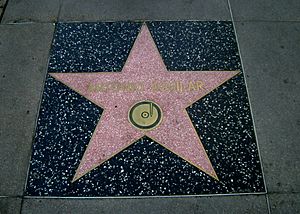
Antonio Aguilar received many awards and honors for his amazing career. In 2000, he was given a star on the Hollywood Walk of Fame in California. This is a very special honor for people who have made great contributions to entertainment.
In the same year, he received the Lo Nuestro Excellence Award and the ASCAP Latin Heritage Award. In 2004, he was honored with the Latin Grammy Lifetime Achievement Award. This award celebrates artists who have had a long and important career in music. He also left his handprints and received a star on the Paseo de las Luminarias in Mexico City. This was to recognize his work in both movies and music.
Discography
- Studio albums
- Éxitos de Antonio Aguilar
- A Grito Abierto
- El Aguijón
- Corridos: Gabino Barrera y 11 Éxitos Más
- Corridos con Antonio Aguilar
- Cantos de Mi Tierra
- Viva el Norte con Antonio Aguilar
- La Voz del Pueblo
- Ya Viene Amaneciendo
- Puras Buenas
- Puras Buenas Vol. II
- La Mula Chula/Arriba Tayahua
- 15 Éxitos 15 con Tambora
- 15 Éxitos 15 Corridos Famosos
- EPs
- Toma esta carta (1960s)
- Antonio Aguilar Nº9 (1960)
- Cancionero Toni Aguilar en Discos "Odeón" (1959)
- Antonio Aguilar Nº4, Nº5, Nº6, Nº7, Nº8 (1958)
See also
 In Spanish: Antonio Aguilar para niños
In Spanish: Antonio Aguilar para niños
- Antonio Aguilar filmography
 | Victor J. Glover |
 | Yvonne Cagle |
 | Jeanette Epps |
 | Bernard A. Harris Jr. |


